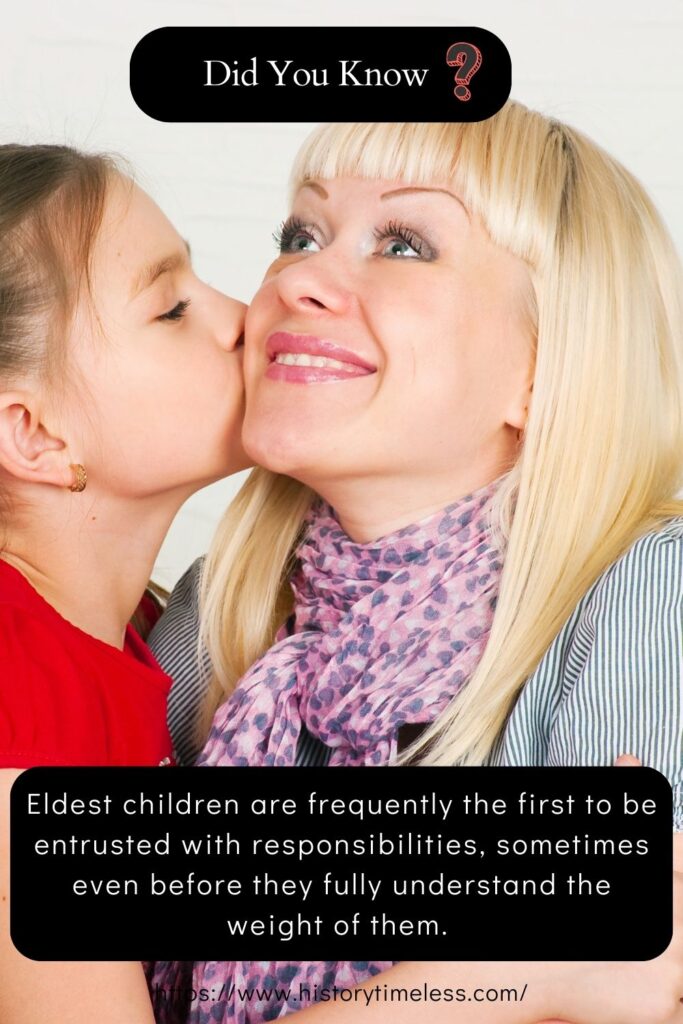Are you an eldest child, or do you know one? Eldest children often carry a unique set of traits and experiences, shaped by their position within the family dynamic.
From being the ‘guinea pig’ for parenting styles to often stepping into leadership roles, their journey is quite distinct. While generalizations should always be approached with caution, certain patterns and tendencies do emerge.
Let’s delve into 25 fascinating facts that shed light on the world of the eldest child, exploring the common threads and unique characteristics that often define their lives. Get ready to see if these resonate with your experiences or understanding of the firstborn!
1. Often Carrying the Crown of Responsibility From a Young Age
Eldest children are frequently the first to be entrusted with responsibilities, sometimes even before they fully understand the weight of them.

This early exposure to chores, looking after younger siblings, or being expected to set a ‘good example’ can instill a strong sense of responsibility.
This isn’t necessarily a burden, but rather a formative experience that shapes their approach to tasks and commitments throughout life. This early training often translates into reliable and dependable adults.
2. Natural Tendency Towards Leadership and Taking Charge
Having been in a position of ‘first’ and often asked to guide younger siblings, eldest children often develop natural leadership qualities. They are used to taking initiative, organizing activities, and making decisions, even in informal settings.
This isn’t about being bossy, but more about a comfortable familiarity with guiding others and taking charge when situations require direction. This leadership tendency can be seen in their school, work, and social lives.
3. Perfectionistic Streaks Rooted in Early Expectations
Being the firstborn often means being the initial focus of parental hopes and dreams. This can, sometimes unintentionally, create pressure to excel and meet high expectations.
Eldest children might internalize this, developing perfectionistic tendencies as they strive to please and succeed in various areas of life.
This drive for perfection can be a double-edged sword, pushing them to achieve, but also potentially leading to stress and self-criticism if not managed well.
4. Strong Sense of Duty and Loyalty to Family
Eldest children often feel a deep sense of duty and loyalty towards their family. They may feel responsible for the well-being of their younger siblings and feel a strong connection to their parents’ values and expectations.
This sense of duty can be a powerful motivator, driving them to support and care for their family members throughout their lives. This loyalty forms a strong foundation for their family relationships.
5. Prone to Being More Conscientious and Organized Individuals
The early exposure to responsibility and the need to manage tasks for themselves and sometimes others can lead to eldest children being more conscientious and organized.
They tend to be detail-oriented, plan ahead, and value structure and order. This isn’t to say they are all rigid, but rather that they often find comfort and efficiency in organization, which helps them manage their responsibilities effectively.
6. Often Displaying Higher Levels of Academic Achievement
Studies have indicated that eldest children often show slightly higher levels of academic achievement on average.
This could be attributed to a combination of factors including more focused parental attention in early years, the role-model effect for younger siblings, and the development of conscientiousness and organizational skills that are beneficial for academic success.
While not a guarantee, the eldest child advantage in academics is a frequently observed trend.
7. Comfortable with Rules and Authority, Respectful of Structure
Having grown up in a household where rules and parental authority are often more firmly established at the beginning, eldest children tend to be more comfortable with structure and respect for authority.
They understand the importance of rules and guidelines and are generally more compliant. This can be beneficial in environments that value order and established protocols, such as school and workplaces.
8. May Exhibit a More Cautious and Risk-Averse Approach to Life
While not universally true, some research suggests that eldest children can be slightly more risk-averse compared to their younger siblings.
This could stem from a greater awareness of potential consequences, a stronger sense of responsibility, or simply a more cautious nature developed from being the ‘first’ to navigate new experiences. This cautious approach can lead to well-considered decisions and a preference for stability.
9. Frequently Serving as Mediators and Peacemakers in Family Dynamics
Eldest children often find themselves in the role of mediator between younger siblings or even between siblings and parents. They develop skills in conflict resolution, negotiation, and understanding different perspectives.
This ability to navigate family dynamics and find common ground can be a valuable asset in all their relationships throughout life.
10. Tendency to be More Verbally Expressive and Articulate
Being the first to engage in conversations with parents and adults, eldest children often develop stronger verbal skills and become more articulate at an earlier age.
They are used to expressing themselves and communicating their needs and ideas. This verbal fluency can be advantageous in communication, presentations, and building relationships.
11. Can Feel Pressure to Always Be the ‘Responsible One’
The expectation to be responsible can sometimes become a burden for eldest children. They might feel pressure to always be the mature, reliable one, even when they need support or want to let loose.
This pressure can lead to internal stress and a feeling of being constantly ‘on duty’, even in situations where it’s not necessary.
12. May Experience a Unique Form of Sibling Rivalry, Especially Initially
Sibling rivalry is a common experience, but for eldest children, it can have a unique flavour, particularly when the first younger sibling arrives.

They might experience feelings of displacement, jealousy, or a need to compete for parental attention that they previously had exclusively. Navigating this initial shift in family dynamics is a key experience for eldest children.
13. Often Become Role Models, Whether They Intend To or Not
Whether they like it or not, eldest children automatically become role models for their younger siblings. Their actions, choices, and achievements are observed and often emulated by their younger siblings.
This role model status can be a source of pride, but also an added pressure to ‘set a good example’, even when they are still figuring things out themselves.
14. May Develop Strong Nurturing and Caregiving Instincts
Having often been involved in caring for younger siblings, eldest children can develop strong nurturing and caregiving instincts.
They learn to be empathetic, protective, and supportive of others. These nurturing qualities extend beyond family and can make them caring friends, partners, and colleagues.
15. More Likely to Uphold Family Traditions and Values
Eldest children, being the first to experience family traditions and learn about family values, are often strong upholders of these.
They may feel a responsibility to pass these traditions down to younger siblings and future generations. This role as a keeper of family heritage can be a source of connection and continuity.
16. Might Struggle with Asking for Help Due to Perceived Independence
Having been positioned as the ‘capable’ and ‘responsible’ one, eldest children may sometimes find it harder to ask for help.
They might perceive it as a sign of weakness or feel they should be able to handle things on their own. Overcoming this reluctance to seek support is an important step in self-care and healthy interdependence.
17. Often Possess a Strong Sense of Justice and Fairness
Perhaps stemming from their role as mediator and their understanding of rules, eldest children often develop a strong sense of justice and fairness.
They are sensitive to unfair treatment and may advocate for what they believe is right, both for themselves and for others. This sense of justice can drive them to be advocates and champions for fairness in various aspects of life.
18. May Exhibit a Tendency Towards Being More Serious and Less Spontaneous
While not always the case, some eldest children can lean towards being more serious and less spontaneous.
The weight of responsibility and the focus on achievement can sometimes overshadow a more playful and carefree approach to life. Finding a balance between responsibility and spontaneity is a key aspect of personal growth.
19. Can Be Highly Self-Reliant and Independent Problem Solvers
Early independence and the need to figure things out as the ‘first’ often fosters strong self-reliance in eldest children.
They become adept at problem-solving on their own and trust in their own capabilities. This self-reliance is a valuable asset, but it’s also important to recognize when collaboration and seeking help can be more effective.
20. May Experience a Unique Bond with Their Parents, Especially in Early Years
The relationship between an eldest child and their parents during the ‘only child’ phase, even if brief, can create a unique bond.
They often experience a period of undivided attention and focused parental investment that shapes their early development and parent-child relationship. This early bond can be a significant foundation for their relationship throughout life.
21. Often Seek Approval and Validation, Particularly from Authority Figures
Having grown up seeking parental approval, eldest children may sometimes continue to seek validation from authority figures in later life, such as teachers, bosses, or mentors.
While positive feedback is important, learning to develop internal validation and self-acceptance is crucial for long-term confidence and well-being.
22. May Have a Stronger Need for Control in Certain Situations
The desire for order and control that often accompanies conscientiousness can sometimes manifest as a stronger need for control in certain situations for eldest children.
This isn’t about being controlling of others, but rather a preference for structure and predictability in their own environment and tasks. Learning to adapt to uncertainty and relinquish control when necessary is a valuable skill.
23. Can Be Highly Protective of Younger Siblings Throughout Life
The protective instincts developed early on often continue throughout life. Eldest children often feel a strong sense of protectiveness towards their younger siblings, even as adults.
They may be the first to offer support, guidance, or intervention if they perceive their siblings are in need. This protective bond is often a lifelong feature of sibling relationships.
24. May Find it Easier to Relate to Older Individuals and Authority Figures
Being accustomed to interacting primarily with adults in their early years, eldest children may sometimes find it easier to relate to older individuals and authority figures.
They are often comfortable in adult conversations and understand hierarchical structures more readily. This comfort can be advantageous in professional and social settings where interacting with older or more senior individuals is common.
25. Ultimately, Each Eldest Child’s Experience is Unique and Shaped by Many Factors
While these facts offer insights into common tendencies, it’s crucial to remember that every eldest child is an individual.
Birth order is just one factor among many – personality, family dynamics, culture, and life experiences all play a significant role in shaping who they become.
Generalizations are helpful starting points, but the richness and complexity of each person’s journey should always be acknowledged and celebrated.
Explore additional captivating facts:
26 Fascinating Facts About England That Will Surprise You!
26 Aquarius Man Facts That Explain His Mysterious Ways!
20+ Insane Facts About Animals That Defy Belief!
15+ Interesting World Facts: Say ‘Wow’ to These Discoveries!





